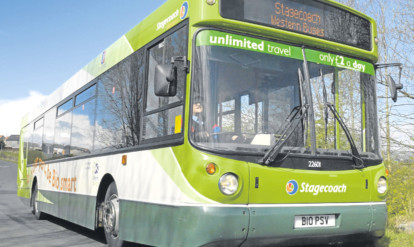Stagecoach yesterday said it is developing a new long-term plan to further reduce its carbon footprint after revealing more than half of its UK fleet is now powered by biofuel.
The Perth public transport giant said it now has more than 4,500 buses in the UK which run on a special 30:70 biofuel/diesel blend produced by Motherwell-based Argent Energy.
The firm said use of the fuel, which is greener than a standard mix typically containing 5% biofuel, had saved an estimated 67,7000 tonnes of CO2e (carbon dioxide equivalent) over the past year.
The figure is equivalent to the emissions output of 27,000 homes and Stagecoach said it expects to more than double that saving in the coming year as the number of its vehicles using the Argent biofuel continues to increase.
“We are committed to becoming a greener business, and an important part of that is to run cleaner, greener buses that will help reduce the impact of our operations on the environment,” Stagecoach UK Bus managing director Robert Montgomery said.
“We were the first major bus company in the UK to run buses
on 100% biofuel and we are continuing to lead the way in the use of this greener blend which allows us to continue delivering our greener, smarter bus services to the millions of people who use them every day, as well as being kinder to the environment.”
The improvements stem from a multi-year plan, which was launched in 2010 and was supported by an £11m investment package, designed to reduce the company’s overall carbon footprint.
Stagecoach began the mass roll-out of biofuelled buses in its east and west Scotland fleets in 2012, and now more than half of its UK regional bus companies use the cleaner fuel.
The firm yesterday said it is committed to further improvements and is developing a new five-year strategy to drive down emissions across its operations.
Argent Energy development director Dickon Posnett said the company was pleased to be supporting Stagecoach in its quest to become a less polluting business.
“Our diesel is made from only the most sustainable waste oils and fats,” Mr Posnett said.
“As well as the green criteria fuel quality is paramount to Stagecoach, who we have been working with for a number of years to develop a large-scale operation to blend and supply a drop-in replacement for standard diesel.
“This level of carbon savings is a great achievement for Stagecoach and it comes with other benefits, such as full fuel analysis to maximise efficiency and fuel supply management, taking the strain off monitoring fuel quality, maintaining tank levels, reporting on greenhouse gas savings and cleaning storage tanks.
“We look forward to helping Stagecoach achieve even greater environmental benefits in the future.”
